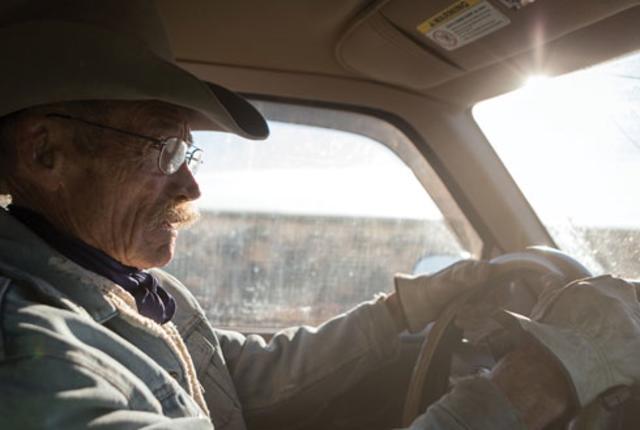Above: Claunch denizen Jerry Cozzen, a retired policeman.

HE SMALL TOWN OF CLAUNCH, in central New Mexico, sits amid a landscape of grassy fields and rolling hills, of windmills and barbed wire fences, of hawks tracing their signature in shadow on the ground as they ride the currents overhead. It’s a beautiful if lonely land, one suited for a canvas by Andrew Wyeth, painted in grama-grass green and weathered-fence-post gray. You can sense that there was something else here before, something big. But only memories of that something homestead here now, proving up their claim in old stone foundations, tumble-down shacks, empty cisterns giving shelter to hibernating bull snakes. Along one stretch of NM 55, which stair-steps its way south from Mountainair to Claunch, a rancher has assembled a display of rusted harrows and combines in what amounts to a visual folk song about the land, with a sign reading in honor of PINTO BEAN ERA 1900–1953.
Every weekday and Saturday morning, a pickup truck rattles into the scene, a sojourner from the modern age.
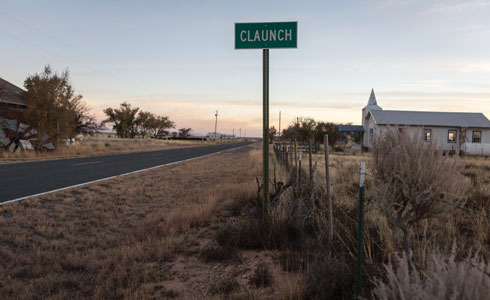
Although the truck has the road to itself for miles in every direction, it keeps a steady 45 miles an hour on pavement, 35 on dirt, and blinks a turn signal when it pulls over, which it does every mile or so on its journey toward Claunch. Aside from the contrail of sound left by the hum of tires across the road, the only other noise is the occasional clank of mailboxes being opened and shut.
Reuben Garrison has been delivering mail on the HC-75 route between Mountainair and Claunch for 23 years, as his father did for 44 years before him, as his father’s father did for six years before that—all the way back to 1942. His daily route takes him past a ramshackle house with a door rocking in the wind—the very house where he was raised. He’ll also pass the abandoned one-room schoolhouse he attended as a child, the blackboard still clinging to the wall, across which the word faith has been written in pink chalk.
Meanwhile, down the road in Claunch, Reuben’s imminent arrival sparks the morning ritual. The 10:35 a.m. mail delivery is not just a matter of routine, it’s a social event.
The Claunch post office reflects that. Two couches rest beneath the large windows, a wood-burning stove provides warmth, and the smell of freshly brewed coffee fills the room. There’s a candy jar on the table, into which someone has placed a dollar to help keep the supply stocked. The building used to be a store, but today the shelves that once held coffee and bread hold books, as the post office doubles as the town library. Fiction is on the north wall, non-fiction on the south, and beyond that, you’re just going to have to browse.

helly Frost is the Claunch postmaster. Which means she is also the town crier, visitor envoy, and activities director. Shelly keeps a dry-erase board on the counter with a list of upcoming events. They include the monthly visit from the Schwan’s grocery man. That delivery is how Claunch residents get their frozen foods—including the most popular item ordered, vanilla ice cream—because at 40 miles away, Mountainair is outside the it-won’t-melt radius. There’s also a community meal and talk from a traveling preacher at the Claunch Women’s Club. Welda Grider is bringing the tacos, the board says, but everyone else must supply the rest.
This is Claunch. Where the night air is so still, you can hear a train passing ten miles away. Where a sole monthly church service is sufficient to remind everyone to keep doing what they’re already doing. Where a wire twisted between a latch and a nail is all you need to lock a barn door.
Bettie Fern Maples arrives at the post office to drop off mail. Bettie Fern and her family moved here when she was just a small child back in 1940. Her father leased land to farm, and Bettie Fern and her siblings helped plow the fields. Later, she moved to Alaska with her husband, but she’s back now. This town has a special attraction that seems to compel people to return.
Romney Todd arrives next. Romney was once a schoolteacher, later a feed salesman, later still an employee with the New Mexico Department of Agriculture. After retiring, he told his wife, Janet, that he wanted to die on a horse, so they moved to Claunch.
Then comes Jerry Cozzen, a retired police officer, married to Bettie Fern’s sister Marjorie.
After Reuben arrives and Shelly begins sorting the mail, everyone visits and chats. About breaking ice in water tanks in winter, about buying horse insurance, about spring calving, serving jury duty, the local road grader, even sleep apnea. Topping it off is a brief discussion on the oddity of being in far eastern Socorro County when the history and economy of Claunch are more closely tied to Torrance or Lincoln County.
“Three, maybe four years ago,” Jerry recalls, “they were having elections here, and they ran out of ballots. So they called Socorro County and they said they’d send them out with the sheriff. After a little while, the deputy called and asked, ‘How do I get there?’”
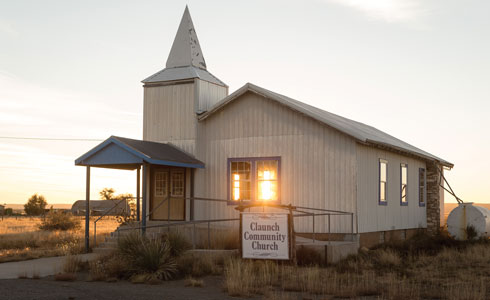
The Claunch Community Church is the last of five houses of worship in the town.

utside the large post office windows, you can see most of what constitutes Claunch today. Across the street is the abandoned Spear Mercantile, which used to sell feed, clothing, and tools. Back in the thirties and forties, the post office swapped locations back and forth between that building and the current one, depending on who wanted to be postmaster. Down from that is the Claunch Community Church, the last of five churches that once existed here. People who knew Claunch in the latter years remember the singing conventions that were held in those churches, joyous occasions when all of central New Mexico came together and sang hymns. There’s a school and a bean elevator, both closed now, a few homes, the Claunch Women’s Club, and a cemetery adorned with solar lamps that glow like fireflies at night.
Down the highway, Billy Bob Shafer spends his days caring for the Rancho Sacate. Every other morning or so, he drives out to his east pasture to feed the heifers, honking his horn to call them, like a dinner bell, and pushing a button inside the truck cab to release feed pellets.
Billy Bob’s ranch used to be called Rancho Secate. But when a friend told him that secate was Spanish for “dry,” a dangerous name for a ranch, Billy Bob removed the letter E from the foot-high letters on his sign, cut off the prongs, and re-welded them into an A. Now the name of his spread, Rancho Sacate, means “grass ranch.”
“I don’t know if it’s going to help,” he laughs. “But it can’t hurt.”
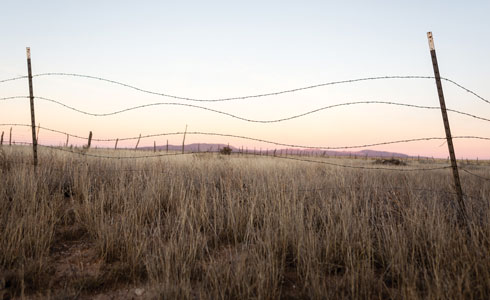
If only someone had thought of that earlier. Driving across a field, Billy Bob points to a fence alongside the pasture. Several years back, he was digging a new fencepost hole there when he hit a metal wire. He dug further, only to uncover a whole other fence underneath his own, buried by dirt blown off the plowed fields that once surrounded Claunch.
The vast swaths of grassland around the town today are the descendants of those fields. In the right light, you can still see impressions of rows and rows of what had once been the cash crop here: pinto beans.
Each field tells a story, about farmers following the Homestead Act west, clearing the land of mesquite and greasewood by hand, planting bean seeds, and dryland-farming their way to a hoped-for prosperity. And in so doing, changing the very character of this part of New Mexico.
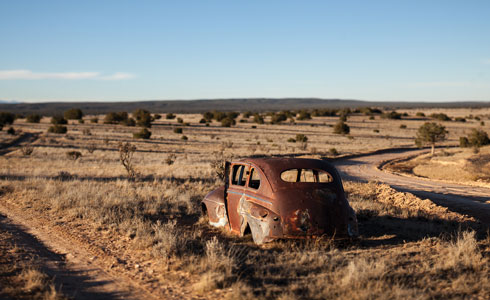
Rush hour.
But then came the drought of the 1950s. The land got drier and drier, the times got harder and harder. Entire communities faded away. Families sold out, or sometimes just abandoned their homesteads outright, leaving their farm equipment to rust in empty fields. A population that had peaked around 400 has dwindled to 17 today.
Some ten miles or so west of the town itself is the old Claunch House, the headquarters of what was once the large Claunch Cattle Company. It’s owned now by Welda and Bill Grider.
Built in 1917 for Mr. L. H. Claunch, the town’s name-sake, the house was a true showcase of its time. Still is. Three bedrooms, two fireplaces, and, at one time, the only grass lawn in Claunch. On the end of the long wrap-around porch is a son-in-law room. Visiting cowboys slept there, as did Welda’s father when he was courting her mother, social convention forbidding them from sleeping inside with the women.
In the kitchen today, you’ll find a number of poultry-related items, like an oven mitt with a picture of a rooster and a spoon holder in the shape of a chicken. They are a tribute to Welda’s grandmother, Roy Lee (an amalgam of Roy Lee’s father’s name, Leroy). Roy Lee was fond of chickens and kept one hen inside the house as a pet. When Roy Lee passed away, her pet hen died soon after. So Welda made a special request of the undertaker.
“I’ve buried cats and dogs with people,’” Welda recalls him responding. “I guess a chicken would be fine.”
The two now rest comfortably together in a nearby cemetery.
The grand house makes an impression, as Mr. Claunch himself apparently did. He was tall, most everyone agrees, often dressed in black, a teetotaler. Friendly, certainly—he and his wife hosted ice cream socials at their house. And well liked. It was the Claunch name that prevailed in 1935 when the time came to name the community.
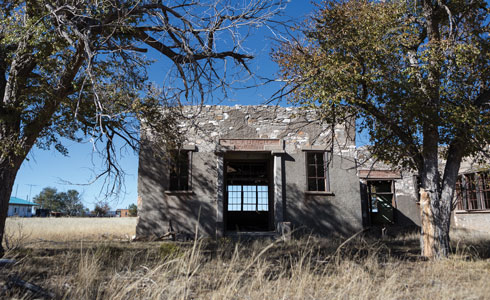
Built by the WPA, the Claunch School had a student body of almost 200 in its 1940s heyday. As farming declined due to drought, attendance dwindled
and the school closed in the 1950s.
A year later, the Works Progress Administration did what they did best and built a school here. Every bit the archetypal WPA school building, it was all brick and cement, with enormous windows. School buses brought students from surrounding ranches to a peak attendance that reached almost 200 kids. Most of them were farm kids, and school administrators knew it.
“If you had to do the harvest at home,” Bettie Fern remembers, “the school would excuse us out of highschool for two or three weeks."
Bettie Fern Maples and her sister Marjorie Crozzen, along with Billy George Montgomery, gather in Bettie Fern's house one evening and remember those days.
Marjorie unfolds the quilt she was given by the Claunch Women’s Club as her wedding present back in 1960. Each square is the name of a Claunch family—the Montgomerys, the Tallys, and many others. Strong and comforting, that quilt represents not just families, not just a community, but a code of ethics: coming together to offer help, sharing when you have extra, sharing when you don’t have extra. And, in return, the privilege of reaching out with every expectation that someone will take your hand.
Billy George’s father homesteaded here back in 1929, making his family one of the earliest to grow beans. He was also the last: He, along with another patriarch of the town, Bill Wells, farmed the last few acres of pinto beans around Claunch, back in 1969.
“I thought at the time it was coming back,” he remembers. “That you could raise something. But it didn’t happen.”
Though Bill Wells passed away last year, his ranch remains in the family. His son, Wendell Wells, along with Wendell’s wife, Jimmie, maintain the extensive property at the north end of Claunch.
Wendell takes a break from his chores one day to drive out to visit the old house where he grew up, not far from where his grandfather originally homesteaded. Across from it is a barn that his father, Bill, built entirely from flattened metal barrels. At one time, the homesteads out here were clustered every half-mile or so, close enough that his grandfather praying outside in the evening could hear other families around him doing the same.
“Out here, your friends are your neighbors,” Wendell says. “And it doesn’t matter if they’re two years old or 100 years old—they’re your friends.”
Closer to their ranch house is an older homestead Wendell’s father felt sentimental toward and kept fixed up. That place has one important historical distinction: It was the site of the first phone in Claunch.
That phone, however, was outside. In a shower stall.
In the mid-1980s, Wendell’s father convinced the phone company to put a jack at the side of the building. Then he found an old tin shower stall and placed it around the phone as a makeshift phone booth. One day, as a joke, someone put an old toilet inside, making the whole thing appear to be an outhouse but nonetheless creating a place to sit. Anyone making a call recorded it in the logbook, then settled with Mr. Wells when the bill came.
Wendell’s family helped create the foundation of this town in a literal sense, too: His great uncle poured the concrete floor of the old Claunch bean elevator, mixing it a batch at a time in a washtub with a hoe. It wasn’t level, but it would stop a pinto bean in free fall.
That old elevator still stands today along the highway in the middle of town. It’s been in the Tally family for years. Standing before the colossal metal structure one afternoon, Berlene Tally turns the key in the lock, opens the door, and sends a shaft of daylight across the interior, spotlighting something completely unexpected and entirely wonderful.

hose are words that could be used to describe Berlene herself. At one time, Berlene’s family farmed some 1,200 acres of pinto beans in Claunch. She still has an old black-and-white photo showing her father on a tractor, and her and her sister, just little girls themselves, on their own tractors on either side of his. A barrel racer in her youth, Berlene later moved away, ended up in California running a gourmet cookware shop, and took ballroom dancing lessons from the man who would become her third husband, Tony Scaccia. After retiring in 1999, she, too, returned to Claunch, with Tony.
Back inside the bean elevator, Berlene uses her shoe to brush off a bit of dirt on a raised portion of flooring. Underneath that dirt is, of all things, a ballroom dance floor.
Though now deceased, Tony, Berlene’s husband, left his mark here. He loved dancing, taught it, lived it. He cleaned up the old bean elevator, put up a museum of old farm equipment on the north end, and installed a dance floor on the south. The very elevator that had once cleaned and sacked pinto beans was thus reborn as a venue for reunions, quinceañeras, and dances.
But one particular event stands out from the rest. It happened on a late-summer evening about ten years ago. About 100 people arrived at the bean elevator that night: the Wellses, the Frosts, local ranchers and others from surrounding communities, all dressed for a night out. Tony introduced the evening’s entertainment—a display of Latin dancing with his former dancing partner from California, Loucinda Carlton. A dancer and choreographer, Loucinda had met Tony when she was auditioning for a Budweiser commercial that required her to brush up on the lambada, and they quickly became friends and dance partners. Once settled in Claunch, Tony and Berlene invited Loucinda to visit them, and to perform one evening as a special presentation to the community. So, after his introduction, Tony started the music on a cassette player, and Loucinda, dressed in a black-sequined Latin dress with rhinestones and tassels, took to the floor and danced a solo. Then Tony joined her, and while the audience watched with admiration and delight, they cha-chaed, sambaed, and tangoed, elegance in motion, in this old bean elevator in the middle of New Mexico.
“It was just fabulous,” Knollene McDaniel recalls of that performance when I visit her at her ranch house south of Claunch. Her ranch has been in the family since the mid-1800s. She inherited it and moved here in 1963, when the last gasps of farming could be found, and ranching became a better use for the land.
“When we were moving in, most of the farmers were leaving out,” she remembers. “And my husband said, ‘Knollene, do they know you’re coming, and they’re all leaving?’”
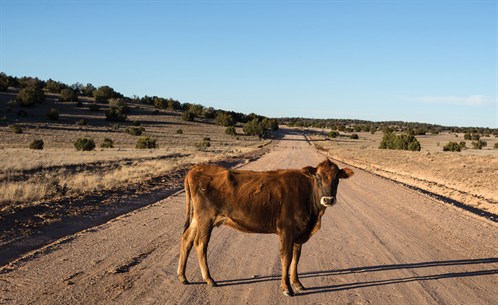
Rush hour 2.
Widowed now, Knollene is as tough as the land itself. She thought nothing of once confronting a trespasser while clad only in her pajamas and boots. Another time, after she was knocked to the ground by a cow and began bleeding from the head, she called Shelly at the post office for help, and, while waiting for her to arrive, snapped a photo of herself as a memento.
Then there’s the time the cows chewed through her TV cable. When she finally convinced the cable company to send someone to replace it, that young man, looking around at all the vast open land here, asked incredulously, “Why would anybody want to live here?”
Knollene’s answer came quickly: “Why wouldn’t they?”
Knollene’s grandson Quirt lives on the ranch and works it in partnership with his grandmother. Late one afternoon, Quirt—he was named for the whip— takes the truck out to look at an old mojonera, a rock monument left by sheepherders many years ago, then past the twisted cedar tree where he married his wife, Natty, last fall. His two Louisiana Catahoula leopard dogs run alongside the truck for part of the way, until he commands them to stop, one of 26 commands he’s taught them, including opening the ranch-house door for his grandmother and loading firewood into the back of his truck with their mouths.
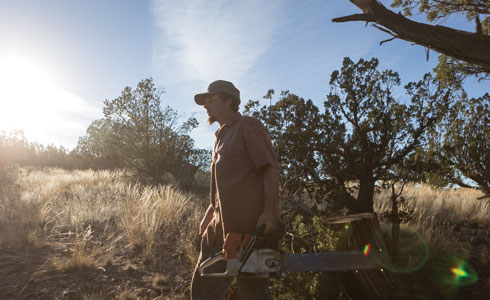
Quirt McDaniel, a former rodeo champion, manages one of the largest ranches in Claunch.
At 25 years old, Quirt is part of the future of this little town, the next square in the Claunch family quilt. He grew up in Claunch, and though the pinto bean farming was gone by the time he was born, he appreciates the rigor of those years. “It takes a lot of faith,” he says, “to put a bean in the ground and pray for rain every year."
He reaches a rise on the northern edge of the ranch and gets out to admire the view. From here you can see all of Claunch. There’s the post office. There’s the bean elevator. There’s Billy Bob’s Rancho Sacate.
At the far end of town is the Claunch Women’s Club. If the club building looks like an old church, that’s because it was. When membership declined, the Baptists gave it to the women of Claunch as a permanent place to meet. Since then, it has hosted monthly club meetings, pie suppers, musical get-togethers (no dancing, per the donation agreement), and lots and lots of quilting. Dues are a dollar a year.
It also hosts community events, like a visit one evening from John Fitzpatrick, an evangelist who travels the country preaching in small communities like this one. Bettie Fern and Marjorie and Jerry Cozzen are in attendance, as are Welda and Bill Grider, Shelly and Duane Frost, Romney and Janet Todd, Wendell and Jimmie Wells, and others.
After finishing his tacos, Mr. Fitzpatrick stands and speaks of forgiveness and salvation and of trusting in a higher power.
Outside, the clouds glow purple in the rays of the setting sun, and soon it is dark. The night arrives forcefully, obliterating the horizon so thoroughly that it becomes impossible to distinguish porch lights from stars. Everything is quiet. Not even a cricket ventures his love song into the darkness. There is only silence, pristine and piercing. It’s as if the earth is being quiet so that something else can be heard.
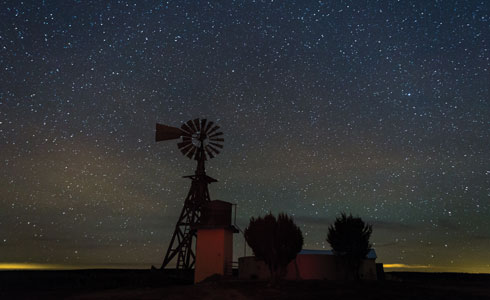
The night sky, seen from the ranch house of L. H. Claunch, who left his legacy as a place-name.
Then, just for an instant—if even that—the night becomes disorienting, even intimidating. All that vast open land, all that immenseness—it’s right there, only an arm’s length away. This close, you can feel its power. The power to test a person’s faith, to rescind at will what has been given. The power to end an era.
The light from inside the Women’s Club casts outward from the windows into the night like a solitary lighthouse on the plains. Inside, Mr. Fitzpatrick concludes his sermon with a short prayer, and everyone joins the “Amen.”
After a moment to let the message settle, someone begins clearing tables, someone else tells a joke, and conversations begin anew. Nobody is in any great hurry to depart. Soon enough, they’ll get in their pick-ups, wave goodbye, and drive off down the highway to home, the red blaze of their taillights being swallowed by the night. But for now, it’s safe and warm in this haven, and the company is good. The people of Claunch have found the best defense against the unknown: each other.
—Contributor David Pike is the author of Roadside New Mexico: A Guide to Historic Markers (UNM Press).
AUTHOR’S NOTE
Sadly, Knollene McDaniel passed away a few months after my visit to Claunch last year. I’m grateful that our paths crossed and know that my memory of her will long outlast our short time together. At Knollene’s remembrance service, person after person rose to speak about her strong-willed approach to life, her love for the beauty of the Claunch area, and her propensity to “cuss on you” should you upset her. “Knollene wasn’t perfect,” Welda Grider said at the service, “but she was perfectly Knollene.”


